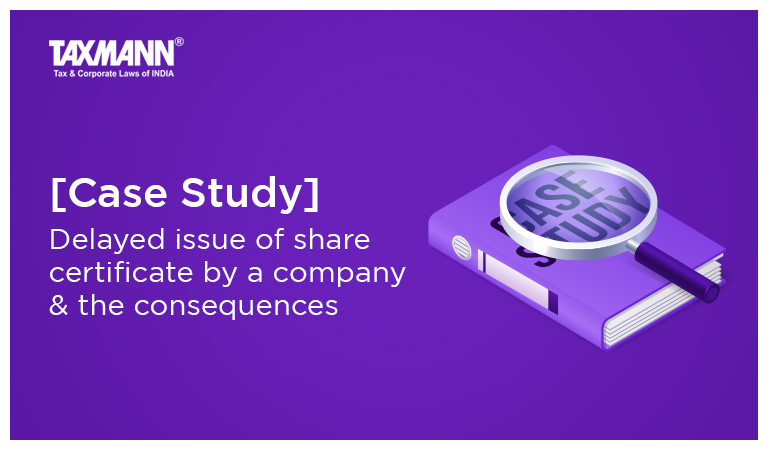[Case Study] Delayed issue of share certificate by a company & the consequences
- Blog|News|Company Law|
- 3 Min Read
- By Taxmann
- |
- Last Updated on 25 July, 2022

[2022] 140 taxmann.com 496 (Article)
1. Share certificate
A share certificate is a written document issued duly signed by authorized signatories on behalf of a company which serves as legal proof of ownership of the number of shares indicated in the certificate. A shareholder receives a share certificate as a receipt of his or her purchase and to reflect ownership of a specified number of shares of the company.
2. Provisions relating to issue of share certificate under the Companies Act 2013
Sub-section 4 of section 56 of the Companies Act 2013 spells out that every company shall, unless prohibited by any provision of law or any order of Court, Tribunal or other authority, deliver the certificates of all securities allotted, transferred or transmitted:-
(a) Within a period of two months from the date of incorporation, in the case of subscribers to the Memorandum and Articles of Association of the company;
(b) Within period of two months from the date of allotment, in the case of any allotment of any of its shares;
(c) Within a period of one month from the date of receipt by the company of the instrument of transfer under sub-section (1) or, as the case may be, of the intimation of transmission under sub-section (2), in the case of a transfer or transmission of securities;
(d) Within period of six months from the date of allotment in the case of any allotment of Debentures.
The proviso to the above section states (i) that where the securities are dealt with in a depository, the company shall intimate the details of allotment of securities to depository immediately on allotment of such securities; (ii) further that a Specified IFSC public company shall deliver the certificates of all securities to subscribers after incorporation, allotment, transfer or transmission within a period of sixty days and a Specified IFSC private company shall deliver the certificates of all securities to subscribers after incorporation, allotment, transfer or transmission within a period of sixty days.
3. Penal provisions in case of noncompliance/default
The penal provision relating to non-compliance or default is spelled in sub-section (6) of section 56 of the Companies Act 2013. As per sub-section (6) of section 56 of the Companies Act, where any default is made in complying with the provisions of sub-sections (1) to (5), the company and every officer of the company who is in default shall be liable to a penalty of fifty thousand rupees.
4. Regulatory actions
To understand the regulatory action in cases of non-compliance / default relating to the delayed issue of share certificate, it would be worthwhile to go through a decided case law on this matter.
5. The relevant case law
On 11th January 2022, the Adjudication order of penalty under section 56 of the Companies Act 2013 read with Rule 3 of the Companies (Adjudication of Penalties) Amendment Rules 2019 was passed by Adjudicating officer & Registrar of Companies of NCT of Delhi and Haryana for violation of the provisions of sub-section 4 of section 56 of the Companies Act 2013 in the matter of M/s Raspberry PI Educational Services Private Limited and we shall go through the details of this case.
6. Details of the company
M/s Raspberry PI Educational Services Private Limited, which is a subsidiary of a foreign company named M/s Raspberry PI Foundation of UK based company incorporated on 26th February 2021 having its registered office at C/o Perfect Accounting & Shared Services Private Limited, E-20, 1st & 2nd Floor, Hauz Khas, Delhi South, West Delhi. The company falls under the jurisdiction of Registrar of Companies, Delhi & Haryana and the Registrar of Company is situated at Delhi. The company’s operations are in the area of providing cheap computer that runs Linus and also providing a set of general purpose input / output (GPIO) allowing the person to control electronic components for physical and explore the Internet of Things (IoT). The company had on its board three directors.
Click Here To Read The Full Article
Disclaimer: The content/information published on the website is only for general information of the user and shall not be construed as legal advice. While the Taxmann has exercised reasonable efforts to ensure the veracity of information/content published, Taxmann shall be under no liability in any manner whatsoever for incorrect information, if any.

Taxmann Publications has a dedicated in-house Research & Editorial Team. This team consists of a team of Chartered Accountants, Company Secretaries, and Lawyers. This team works under the guidance and supervision of editor-in-chief Mr Rakesh Bhargava.
The Research and Editorial Team is responsible for developing reliable and accurate content for the readers. The team follows the six-sigma approach to achieve the benchmark of zero error in its publications and research platforms. The team ensures that the following publication guidelines are thoroughly followed while developing the content:
- The statutory material is obtained only from the authorized and reliable sources
- All the latest developments in the judicial and legislative fields are covered
- Prepare the analytical write-ups on current, controversial, and important issues to help the readers to understand the concept and its implications
- Every content published by Taxmann is complete, accurate and lucid
- All evidence-based statements are supported with proper reference to Section, Circular No., Notification No. or citations
- The golden rules of grammar, style and consistency are thoroughly followed
- Font and size that’s easy to read and remain consistent across all imprint and digital publications are applied



 CA | CS | CMA
CA | CS | CMA
